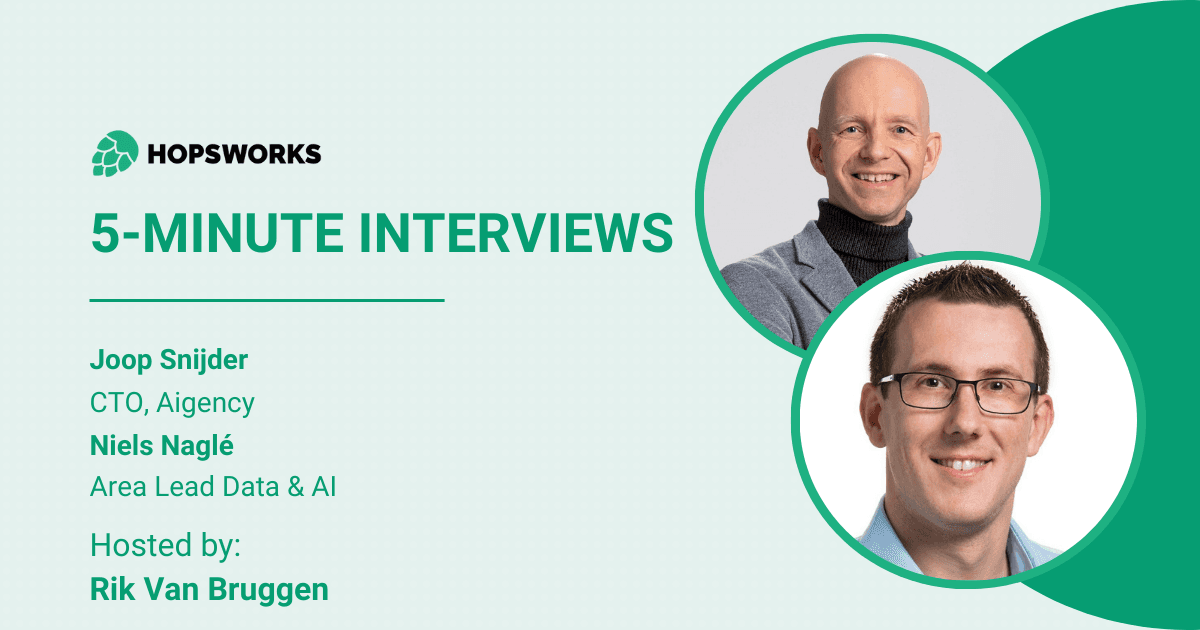5-minute interview Niels Naglé and Joop Snijder
This week Rik met with Niels Naglé, Area Lead Data & AI at Info Support, and Joop Snijder, CTO at Aigency, for a quick chat.

“ ML adds value to my team, to myself, and to the customers we work for.”
This week Rik met with Niels Naglé, Area Lead Data & AI at Info Support, and Joop Snijder, CTO at Aigency, for a quick chat.
Tell us a little bit about yourselves:
Niels: My name is Niels Naglé and I’m working for Info Support as a Data and AI area lead. Which means that I'm investigating and monitoring the developments on data and AI and to see where the market is going. With these insights I help our consultants in the field with project deadlines.
Joop: And my name is Joop Snijder. I'm the Chief Technology Officer of Aigency, a part of the Info Support. I'm also the Head of Research Center AI at Info Support. At Aigency we make custom machine learning systems for our clients, mostly in the Netherlands. Within the research center, we guide Master and PhD students with their assignments. Hopefully we manage to create a bridge between the scientific field, the students and our clients.
How did you get into the field of ML and AI?
Joop: For me, it started about 12 years ago. Originally, I'm a software engineer, back then we were building a knowledge management system. At that time, we didn't know that we’d started in the field of machine learning because we just had a couple of problems in the fields of natural language processing. Then we wanted to do recommendation systems so that's where it kind of started, and along the way we learned that this is what’s called AI machine learning. So I continued in the field of AI because back then I was thinking that this would be big in the future. 12 years ago, we were in the winter of AI, so we were one of the front runners. So today I have a lot of experience in the field.
Niels: I started in the field of data from college, so in 2007 I graduated with a specialization in data. At the time, I did a lot of projects, for example implementing data platforms and data solutions. But we wanted to do more advanced analytics on data, which led us to machine learning and AI. So I rolled into it as an extra way to get the value out of the data.
Why did you get into the field of ML and AI?
Joop: It feels almost like it’s a part of me, probably because it’s a balance between solving puzzles and having an engineering problem. It's not obvious how you get to a solution and that's what attracts me a lot. Especially at that time, we could solve things that we couldn't solve with traditional software engineering. I like innovative new things and changes, so that's really why it got to me. I was searching for a way to solve problems.
Niels: For me it’s how it adds value. ML adds value to my team, to myself and to the customers we work for. It’s a creative and good way to create value with the tooling and technology that comes at hands within the data and AI. So, really getting customers forward in their journey and helping them. So, it's the puzzle combination of which direction we want to go and how technology can help us on that road.
Do you have any interesting to recommend?
Joop: Besides our podcast I have a few resources to recommend. I think we can learn a lot from the field of software engineering and there's particularly one book called “Machine Learning Design Patterns”, and it's all about how to do MLOps in a professional way and in a repeatable manner. So I think if you have to read one book that's the one, and after you read that I also really recommend the book of Chip Huyen “Designing Machine Learning Systems”.
Niels: I agree with Joop on the need to go professional on developing solutions with MLOps and the experience we have in the software development cycle. I can really recommend the book by Joy Buolamwini, “Unmasking AI”. But also the “Coded Bias” Netflix documentary about the side effects that technology can bring us and which we should be aware and think of when we're designing these solutions for the community, the public and organizations.
Listen to the full episode: